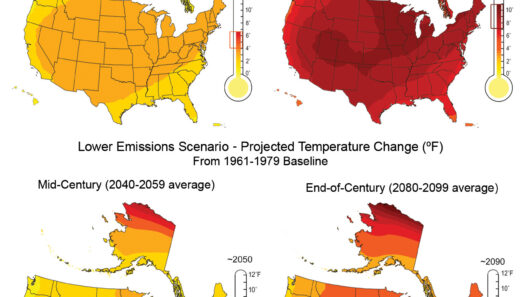In an era marked by rapid industrialization and rising consumerism, the repercussions of our consumption patterns have illuminated a pivotal narrative: the hidden climate impact of our wasteful habits. The relationship between consumption and environmental degradation is intricate, though often obscured beneath layers of convenience and modernity. From the manufacturing of goods to their eventual disposal, the lifecycle of products presents an alarming environmental cost, one that demands scrutiny and action.
At the outset, we must consider the sheer scale of consumption in contemporary societies. In the United States alone, an estimated 255 million tons of municipal solid waste is generated annually. This staggering figure underscores the pervasive culture of disposability that characterizes modern life. However, the implications extend far beyond overflowing landfills; each phase of a product’s lifecycle contributes to carbon emissions, resource depletion, and ecological disarray.
The journey begins with resource extraction, an often-overlooked aspect of consumption. Natural resources such as timber, minerals, and fossil fuels are harvested at an alarming rate to meet relentless global demand. The extraction processes—mining, logging, and drilling—are not only invasive but also leave a significant footprint on local ecosystems, often leading to habitat destruction and loss of biodiversity. For instance, tropical deforestation, driven largely by the demand for wood and palm oil, contributes approximately 10-15% of global greenhouse gas emissions. This is because once trees are felled, the carbon they stored is released back into the atmosphere, exacerbating climate change.
Once harvested, resources undergo processing and manufacturing, operations laden with their own set of environmental costs. The factories that churn out our favored products are often powered by fossil fuels, resulting in significant carbon emissions. Furthermore, the production of goods consumes vast amounts of water and energy, straining local resources and contributing to the ecological crisis. For example, the textile industry, a major player in global consumption, is known to require an average of 7,500 liters of water to produce just one pair of jeans, a staggering statistic considering the water scarcity many regions face.
Transportation, the next stage in the product lifecycle, further compounds the climate crisis. The movement of goods from factories to consumers is intricately tied to fossil fuel usage. Trucks, ships, and planes contribute immensely to greenhouse gas emissions. The global supply chain, while efficient in delivering products, comes at a dire cost to our planet. Emissions from transportation account for approximately 25% of global CO2 emissions, highlighting the urgent need for innovative solutions such as transitioning to sustainable logistics and local production.
Upon reaching consumers, products often fulfill their purpose within a transient phase, after which they are frequently cast aside, contributing to a culture of wastefulness. The average American throws away about 4.4 pounds of trash daily. The sheer volume of discarded items fuels vast landfills and incinerators, where waste decomposes and emits methane, a potent greenhouse gas. Landfills are now one of the largest sources of methane emissions globally, accounting for approximately 15% of total methane emissions. This cycle of production and disposal embodies a linear economy that is unsustainable in the face of escalating climate challenges.
Furthermore, the consumer mindset plays an instrumental role in perpetuating wasteful habits. The allure of fast fashion, for example, has created a disposable culture where clothing is worn just a few times before being discarded. This phenomenon not only strains environmental resources but also perpetuates social injustices in labor markets across the globe. The demand for cheap, fashionable goods often leads to exploitative labor practices, primarily in developing nations, raising moral imperatives alongside environmental concerns.
Addressing these issues requires a conscious shift toward more sustainable consumption patterns. Moving away from a linear economy to a circular economy presents a viable alternative. In a circular economy, products are designed for longevity, reparability, and recyclability, minimizing waste and resource consumption. Consumers must become more mindful of their purchasing decisions, emphasizing quality and sustainability over quantity. Supporting local artisan producers or businesses that prioritize ecological practices can also foster a more sustainable marketplace.
Education plays a vital role in promoting responsible consumption. Awareness campaigns can effectively enlighten consumers about the implications of their purchasing habits, forging a deeper connection between personal choices and their broader environmental impact. Through workshops, community engagement, and digital platforms, individuals can gain insights into sustainable practices, empowering them to make informed decisions.
Policy intervention is equally essential. Governments and regulatory bodies must enact legislation that incentivizes sustainable practices and penalizes wasteful behaviors. Alongside policies, investment in green technologies and infrastructure can catalyze a transition toward sustainable consumption. Developing alternatives such as biodegradable materials and enhancing recycling systems are critical steps in mitigating the negative externalities of current practices.
Ultimately, confronting the climate crisis requires a paradigm shift in how we perceive consumption. By recognizing the interconnectedness of our choices and their environmental ramifications, we can begin to dismantle a culture of wastefulness. Sustaining our planet necessitates not only personal responsibility but also collective action, where individuals, communities, and governments unite in a shared mission to reduce consumption’s cost on the environment. The journey may be challenging, yet the path forward is illuminated by conscious choices, innovative practices, and unwavering commitment to a more sustainable future.







